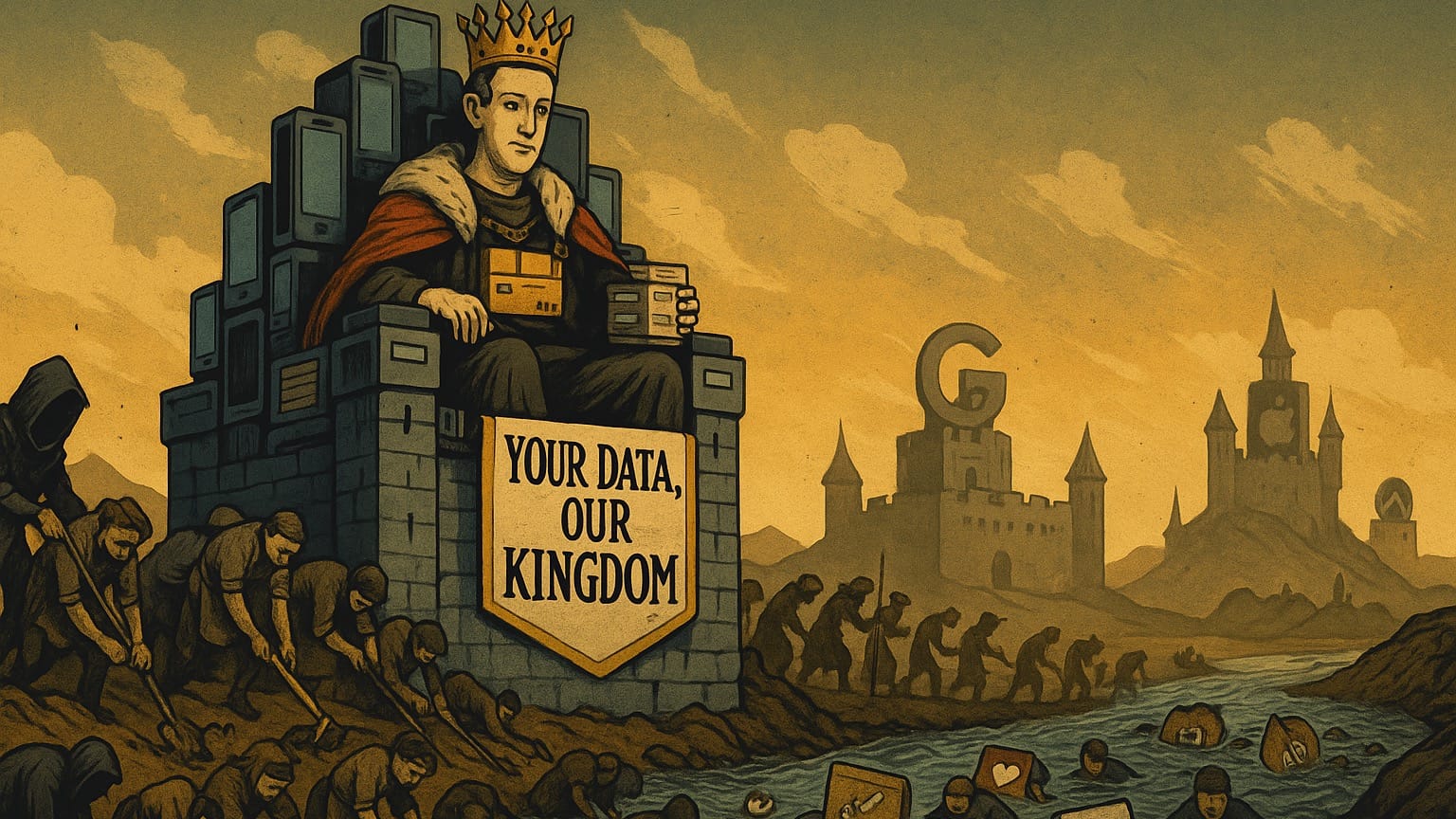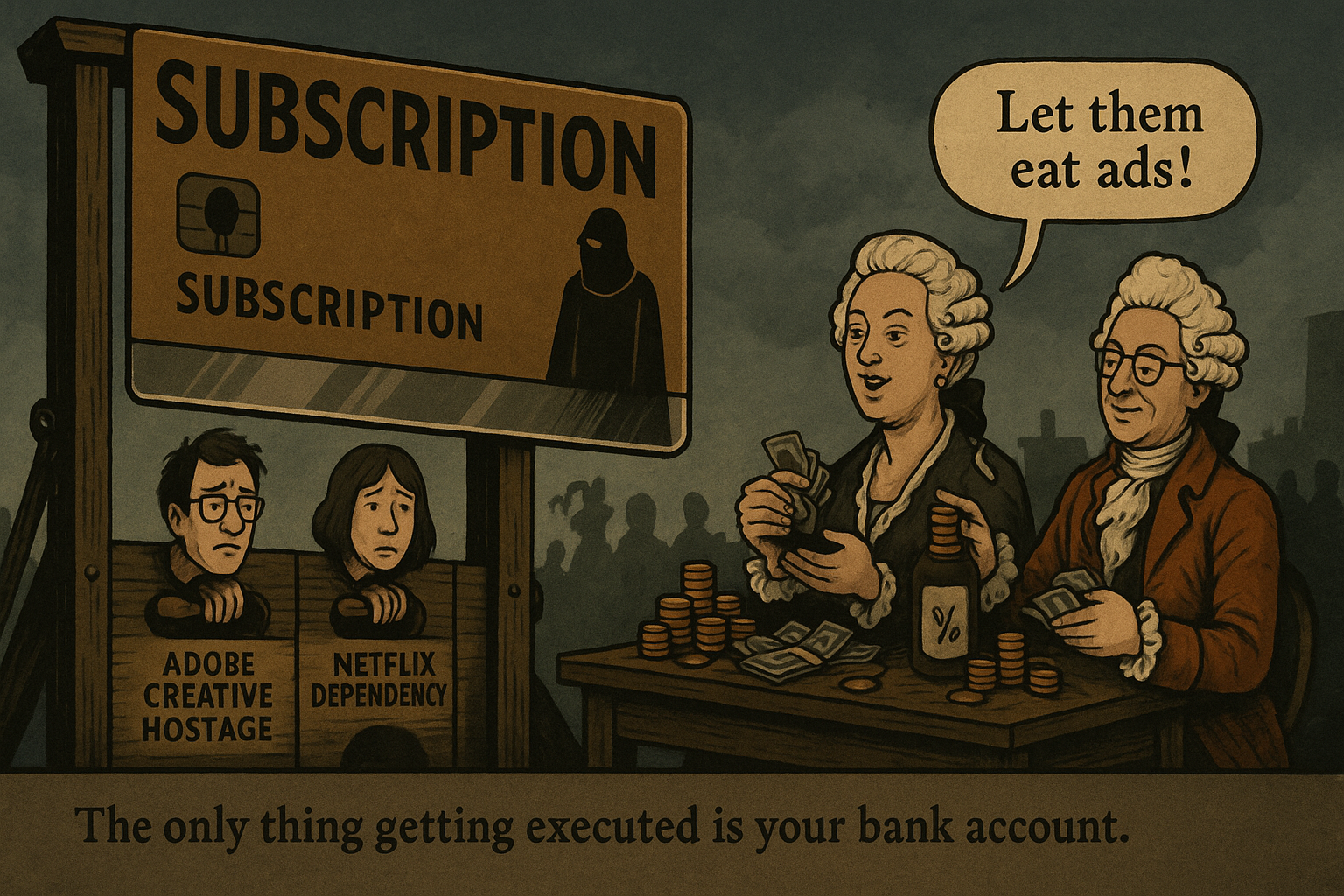Or: How I Learned to Stop Worrying and Love My Digital Feudal Lords (Spoiler Alert: I Fucking Hate Them)
Back in 1863, some Victorian gentleman named Samuel Butler wrote a letter to a New Zealand newspaper warning that machines would eventually rule over humanity. Butler, bless his top-hat-wearing heart, believed our future robot overlords would be benevolent creatures "disturbed by no regrets" and free from "evil passions" and "avarice."
You sweet, innocent bastard, if only you could see us now.
Butler's noble machines never showed up. Instead, we got something infinitely worse: a handful of sociopathic tech bros who figured out how to weaponize our tools against us while convincing us it was innovation. Welcome to the age of enshittification—a term coined by the brilliant Cory Doctorow to describe the systematic degradation of platforms for profit—where everything gets deliberately worse so a few Silicon Valley psychopaths can buy more rockets and pretend they're saving humanity.

The Subscription Scam: Death by a Thousand Monthly Fees (AKA Digital Extortion)
Remember when you could buy software? I know, I know—what a quaint fucking concept. Photoshop used to cost money upfront, but then you owned it. It worked. It did photo editing things. You could use it forever, like some kind of digital caveman, with your permanent ownership and functional products.
Adobe looked at this arrangement—customers paying once for software that continued working indefinitely—and some executive said, "Jesus Christ, we're leaving money on the table here. What if we held their creative work hostage and made them pay us forever like some digital protection racket?"
Now you pay Adobe $30+ a month for the privilege of using software that's barely improved since the Obama administration. They've essentially figured out how to turn every purchase into an extortion scheme. Want to access your old projects? Pay up, peasant. Need to do basic photo editing that a free app could handle? That'll be $240 a year, plus our eternal gratitude for not pirating our bloated, subscription-locked garbage.
This cancer has metastasized everywhere like capitalism on steroids. Netflix pioneered the streaming racket—"Hey, what if instead of owning movies, people just paid us forever for the privilege of maybe watching them sometimes?"—but now you need seventeen different services to watch what used to be available in one place or just, you know, owned outright. They've taken the simple act of watching a movie and turned it into a monthly tribute system that would make medieval lords weep with envy.

Google: The Search Engine That Deliberately Forgot How to Search (For Your Own Good!)
Google used to be good. No, really, stop laughing. You'd type something in, get relevant results, find what you needed, and move on with your life like some kind of efficient information-gathering savage.
But here's the thing about efficient search: satisfied users are absolute dogshit for business. Think about it, you naive little consumer. A person who finds exactly what they're looking for on the first try doesn't click on ads. They don't stick around generating precious "engagement." They don't scroll through sponsored listings for penis pills, drop-shipping schemes, and whatever the fuck a "tactical flashlight" is supposed to be. They're useless to Google's revenue model—digital dead weight.
So, Google systematically broke their search engine with the methodical precision of a serial killer arranging furniture. Now the first page is a post-apocalyptic wasteland of SEO-gamed garbage, affiliate link farms, and AI-generated nonsense that reads like it was written by a chatbot having a stroke.
You know your product has catastrophically failed when users routinely add "reddit" to searches just to find actual human opinions instead of bot-generated content farms optimized by algorithms designed to make you dumber. It's like needing to add "real food" to your restaurant searches to avoid being served cardboard shaped like a hamburger.
The truly twisted part? This feels intentional. Google makes money when you click around confused and frustrated like a lab rat in a maze designed by sadists, not when you efficiently find information and fuck off to live your life. They've turned the world's knowledge index into a casino slot machine designed to keep you pulling the lever while they rifle through your digital pockets.
Facebook: Where Human Connection Goes to Die a Slow, Algorithmic Death
Mark Zuckerberg looked at human friendship—one of the few remaining non-monetized aspects of existence—and thought, "How can I turn this beautiful thing into a psychological weapon that generates ad revenue?"
The answer was to gradually replace your actual friends with algorithmic rage-bait designed to keep you scrolling like a digital zombie apocalypse survivor searching for human connection in a wasteland of sponsored content.
Facebook doesn't even pretend to show you what your actual friends post anymore. That photo of your college buddy's new baby—the one you actually want to see? Buried under seventeen sponsored posts for tactical flashlights, MLM schemes, and ads for products that look suspiciously like they fell off a truck in Shenzhen. But that inflammatory political meme designed to make your blood pressure spike and your grandmother comment something racist? Front and center, baby! The algorithm says grandma's casual fascism generates 47% more engagement than human joy.
And now Zuckerberg's latest innovation: AI "friends" for lonely people. Yes, instead of fixing the platform so you can connect with actual humans like some kind of functional social network, his solution is to replace human relationships entirely with chatbots programmed to validate your existence in exchange for data harvesting.
It's like he looked at the loneliness epidemic his platform helped create—a generation of people who can't form genuine connections because they've been trained to perform for algorithmic approval—and thought, "Perfect! Now I can sell them synthetic friendship, too! It's the final solution to the human connection problem!"
The man has successfully weaponized friendship itself and turned social interaction into a subscription service. That's not innovation—that's sociopathy with a Terms of Service agreement and a cheerful interface design.
The Pattern: Attract, Extract, Abandon (AKA The Silicon Valley Playbook for Digital Parasitism)
Here's how tech enshittification works, because we needed a manual for advanced capitalism:
- The Honeymoon Phase: Create something genuinely worthwhile—hook users with quality and convenience, like dealers giving out free samples.
- The Bait-and-Switch: Once you dominate the market, gradually degrade the service while extracting maximum value like digital strip-mining operations.
- The Hostage Situation: Make alternatives impossible or inconvenient. Users are now trapped in your ecosystem like digital Stockholm syndrome victims.
- The Rent-Seeking Endgame: Transform every transaction into a subscription, every interaction into data harvesting, and every convenience into dependency. Congratulations, you've just invented digital feudalism!
Amazon was a simple bookstore with good customer service and fair prices. Now it's a convoluted nightmare of counterfeit goods, where finding what you want means sifting through pages of sponsored listings, fake reviews, and products that appear as if they were created by an AI having a nervous breakdown.
Uber "disrupted" the taxi industry by doing what every Silicon Valley company does: ignoring labour laws, subsidizing their service with venture capital money until they killed the competition, then jacking up prices once they controlled the market. It's like economic warfare disguised as an app. Now that they dominate, rides cost more than traditional taxis ever did, drivers are classified as contractors so Uber can avoid providing benefits, and somehow, the company still isn't profitable. It's a business model that would make a mob accountant weep with admiration.
YouTube went from "broadcast yourself" to "watch seventeen unskippable ads while we suppress your favourite creators and promote engagement-farming garbage designed to turn your brain into pudding." They took the democratization of video content and turned it into a psychological warfare platform optimized for addiction and ad revenue.
The pattern is always the same: replace something that worked with something that generates more data and recurring revenue, regardless of whether it serves users better or makes the world a more tolerable place to exist.

The Resistance: Fighting Back Against Our Digital Overlords
The good news? These parasites are more vulnerable than they let on, like vampires who've convinced everyone that garlic is just a myth. Their power depends wholly on our participation, and every defection removes another brick from their digital prison.
Use Signal instead of WhatsApp. Try Firefox instead of Chrome. DuckDuckGo instead of Google. Support creators directly instead of through platform middlemen who take a cut of everything, like digital mob enforcers (cough Substack). Buy used instead of new. Keep your old phone longer; it still works, despite what the upgrade cycle wants you to believe. Pay for services that respect users instead of using "free" ones that treat you like the product being sold to advertisers.
If enough people jump ship, these platforms become worthless. Network effects work both ways; they can collapse as quickly as they grow, like a house of cards built on user data and subscription fees.
Vote in your local elections. Your voice has a chance to be heard instead of being drowned out by corporate lobbying. Support right-to-repair laws, which allow you to fix your shit. Contact representatives about antitrust enforcement. These companies spend millions on lobbying because they're genuinely terrified of regulation. They know their business models couldn't survive actual scrutiny.
Most importantly, stop pretending this is inevitable technological progress. This isn't evolution, it's exploitation with a user-friendly interface. Butler's machines never showed up because we got something worse: humans who learned to think like machines, optimizing exclusively for-profit extraction while systematically degrading everything that makes life worth living.
The tech oligarchs want us to feel powerless. They want us to believe that surveillance capitalism and subscription feudalism are just the natural order of things, like gravity or death or having to restart your router twice a week.
They're wrong. And deep down, beneath all the vulture capital and motivational posters about "changing the world," they know it. That's why they're desperate to keep us scrolling, clicking, and paying like digital livestock in a techno-capitalist nightmare. The moment we collectively decide we've had enough is the moment their whole rotten system collapses like a Ponzi scheme built on user engagement metrics.
The question isn't whether we can resist the tech oligarchy. The question is whether we'll do it before they finish turning us all into data-generating zombies shuffling through their digital shopping malls, clicking on ads for products we don't need while our actual friendships wither away into algorithmic approximations.
Time to find out, you beautiful digital rebels.


